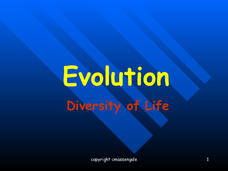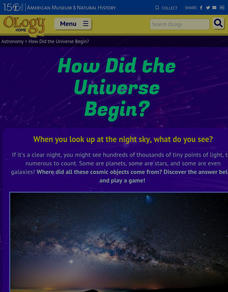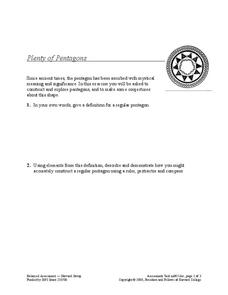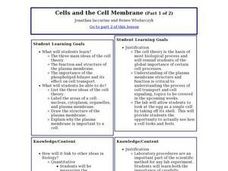NASA
What’s the Problem with Isotropy?
Some patterns are so small, we can't see them without the help of technology. The same is true for cosmic microwave background radiation. During this activity and discussion, scholars examine both anisotropic and isotropic items and...
Biology Junction
Evolution – Diversity of Life
Scientists noticed animals with backbones share similar bone structure despite having different forms, such as fins, arms, and wings. Young scientists gain an appreciation for evolution by understanding the history of the theory. They...
Santa Monica College
Lewis Structures and Molecular Shapes
Learners practice drawing Lewis dot structures, build molecules with model kits, and predict molecular shapes using VSEPR theory. The combination of written work and hands-on reinforcement benefits young scientists.
American Museum of Natural History
How Did the Universe Begin?
The Big Bang Theory is more than a television show. Pupils read how Edwin Hubble observed other galaxies and noticed that the galaxies are moving away from each other. Scholars learn about the idea of the big bang and what happened next...
NASA
Raisin Bread Universe
What is the universal breakfast? The resource includes two activities, the first one observing oatmeal to understand the texture of the universe. Then, scholars measure raisin bread dough before and after it rises to represent the...
Curated OER
Understanding the Cosmic Microwave Background (CMB)
How did our universe really begin? Explore the Science Big Bang Theory and Cosmic Microwave Background (CMB) with this multiple activity-based lesson that demonstrates that the increase of density due to the decrease of temperatures,...
American Museum of Natural History
What Do You Know About the Universe?
The universe is full of a mystic matter people cannot see. Pupils respond to 10 questions about the stuff in the universe. Most of the questions involve the big bang theory and dark matter. Learners find out how astronomers have found...
It's About Time
Conservation of Momentum
Assist your class with understanding collisions as they apply the Law of Conservation of Momentum. Pupils measure the momentum before and after manipulation of two objects so that one strikes another in an inelastic collision. The lesson...
Fun Music Company
Writing Major Scales
Designed as an assessment of understanding, this one-page worksheet asks musicians to demonstrate their understanding of scales by drawing C, G, and F Major scales on the provided staffs.
Fun Music Company
Working Out the Key
"Gimme an E minor!" Or any key for that matter. But how do you figure out the key of a piece of music? Here's a activity that shows young musicians three easy steps to help them identify the key of a piece of music.
Fun Music Company
Classification of Intervals
Major 2nd, Perfect 4th, Minor 3rd. The number and classification of intervals are the focus of a one-page worksheet that asks musicians to write the intervals above given notes and to indicate the classification of others.
Science Geek
VSEPR and Molecular Geometry
Many chemistry jokes have no reaction. Presentation begins by explaining what models are and the limitations of various forms before introducing the VSEPR model. Then it outlines the rules for creating a VSEPR model and shows examples of...
Balanced Assessment
Plenty of Pentagons
Why are only four colors needed to color webs from regular pentagons, not five? An assessment task requires young mathematicians to first construct regular pentagons using a compass and straightedge, then has them consider a shape formed...
Curated OER
Collision Theory Worksheet
In this reactions activity, students explain why all reactions have an activation energy using their understanding of collision theory. This activity has 4 short answer questions.
Curated OER
Atomic Theory, Structure, and Symbols
In this atomic theory learning exercise, students review the observations that led to the conclusion of the atom having a positively charged nucleus. Students compare atomic number and mass number and explain how the discovery of...
Curated OER
Kinetic Theory
Students describe how molecules of the different phases of matter move according to the Kinetic Theory. In this chemistry lesson, students observe and participate in teacher demos. They give real world applications of the kinetic theory.
Curated OER
Bonding Theories
In this bonding worksheet, students fill in 8 blanks with the appropriate terms about theories of bonding, they determine if 6 statements are true or false, they match 5 terms with their meanings and they solve 1 problem related to...
Curated OER
The History of the Theory of Evolution
Students research the history of the theory of evolution and make a comparative timeline of events in world history and in the history of evolutionary theory.
Curated OER
Unit 3 Cell Structures: Cell Theory & Organelles
Students examine cell structures in depth. They decide what grade they want to work for and do the assignments for that grade. They complete various assignments on cell theory and organelles.
Curated OER
Quiz on Cell Theory
In this cell theory quiz worksheet, students complete an on-line game, clicking on questions and matching answer cards and scoring 1 point per correct answer. Printable version available also.
Curated OER
Atomic Theory
In this atomic theory worksheet, students use Planck's constant, Rydberg constant, and Avogadro's number to complete 20 multiple choice questions.
Mrs. Glosser's Math Goodies
Number Theory Worksheet 3
A nine-row data table has novice number crunchers fill in columns for the greatest common factor, least common multiple, product of the two, and product of numbers. The pairs of numbers to work with are all single- and double-digit...
Curated OER
Cells and the Cell Membrane
Students investigate the properties of cell membranes by isolating the membrane surrounding chicken eggs. They set up an experiment by placing eggs in a vinegar solution for three days. A powerpoint lecture emphasizes the structure of...
Curated OER
7th Science Quiz
This seventh grade life science quiz has a professional appearance and well-written multiple-choice questions. However, it seems to cover too broad a variety of biology topics for only 15 questions to fully assess. There is one question...
Other popular searches
- Math Number Theory
- Number Theory and Operations
- Number Theory 1
- Number Theory Rounding
- Number Theory Ed Helper
- Number Theory Ii
- Number Theory Edhelper
- Number Theory Concepts
- Number Theory Lesson Plans
- Math + Number Theory
- Egypt Math Number Theory
- Color Tiles Number Theory

























